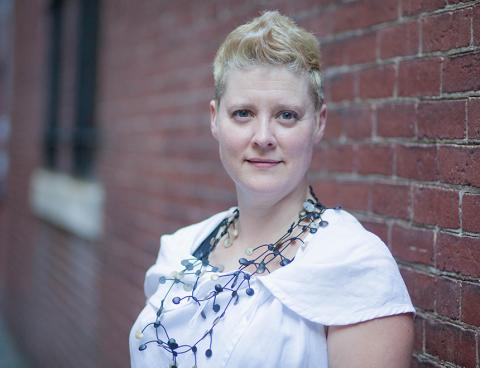Q&A with Tony Arnold

Boston Conservatory Artist-in-Residence and acclaimed soprano Tony Arnold will spend the 2015–2016 academic year focusing on the creation of new works using students in all the disciplines, including work with composers, singers, instrumentalists, poets, and actors. In addition, she will teach music history and composition, conduct the Boston Conservatory's new music ensemble and perform as part of the New Music Festival in February 2016. Read her thoughts on contemporary music and what students can expect to learn during her residency.
What is contemporary music?
Hot-off-the-press sonic imagery inspired by 500+ years of tradition(s).
Why do you love performing contemporary music?
New music is a place where I can wind together the infinite number of strands of art, culture and philosophy that have inspired me: from Monteverdi and Bach to Webern and Ligeti; from Giotto to Hieronymus Bosch to Pollock; from Tibetan Buddhism to Wilhelm Reich’s Character Analysis to the poetry of Hafiz. Exploration of a modern repertory truly requires the presence of your entire being in order to meet it the fullest way possible.
How is the experience of performing contemporary music different than classical music?
It is not different in terms of the process of embodying a work. Only the content differs.
What are you most passionate about?
I am most passionate about finding how a piece of music lives, works and rests in and through my body. I love exploring how that same piece affects each body uniquely, and helping singers and instrumentalists find expression that honors both the music and the body as it is in the present moment. I also love to engage composers in the process of creating new works through an embodied practice.
If you could do anything on stage, what would it be?
Be perfectly still and at complete ease.
What or where is the most interesting place you've performed?
At sunset on the beaches of the North Sea in Terschelling, Holland. It was for performances of Louis Andriessen’s Odyssey with the Beppie Blankert Dance Company. One night, we performed through a thunderstorm…. we were drenched, and the electrical system shorted out. But the show went on!
If you had to choose one word to describe your teaching style/philosophy, what would it be?
Embodiment.
What skills will your students master in your class?
Students will seek to master all of the things that I continually wrangle with as a professional: stylistic fluency, technical acumen, scrupulous attention to detail, control of the architecture of a performance, investing in metaphor, listening and sensing beyond the body, letting go.
How are you preparing your students to lead?
Developing heightened awareness is the first order of business in any education. One must become aware in order to know that there is a need to be addressed. Learning how to approach networks organically with awareness and sensitivity is foundational for both musicianship and leadership.
What makes the Conservatory 'the' place to study contemporary music performance?
The Boston Conservatory has both a world-class faculty and a can-do spirit that risks failure in order to see what’s on the other side.
What kind of student do you want to work with?
One who seeks to find balance between the absolutely essential aspects of rigor and abandon.
What kind of work are you interested in exploring?
Music that utilizes pitch and timbre as both complimentary and unified aspects.
